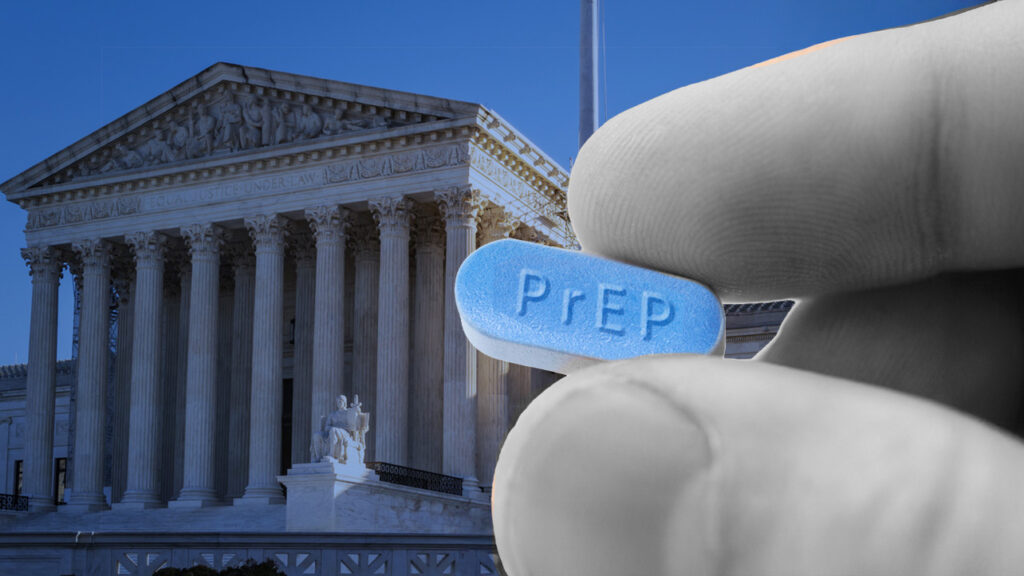Preventive Care Coverage Quietly Survives Supreme Court Review
Ruling protects PrEP and other no-cost services, despite religious challenge.

One case during the current U.S. Supreme Court term potentially jeopardized funding for preventive care for HIV, breast cancer, and other serious illnesses. But the case—Kennedy v. Braidwood (aka HHS v. Braidwood)— was not about funding for those issues. It was about who has the authority to choose which preventive care options the federal government can mandate health insurance covers.
And a 6 to 3 majority of the Supreme Court said the recommendations were already being properly set by a Task Force under the Department of Health and Human Services.
Carl Schmid, executive director of the HIV+Hepatitis Policy Institute, called the decision “a great victory for healthcare in our country and for everyone who believes in prevention, including the Trump administration.”
Justice Brett Kavanaugh penned the 6 to 3 majority opinion, joined by Chief Justice John Roberts Jr. and Justices Sonia Sotomayor, Elena Kagan, Amy Coney Barrett, and Kentanji Brown Jackson. Justice Clarence Thomas wrote a dissent joined by Justices Samuel Alito and Neil Gorsuch.
The decision in Braidwood arose out of a lawsuit by a small group of businesses and individuals in the Houston, Texas, area.
The plaintiffs, led by a holistic wellness company called Braidwood Management, said their religious beliefs conflict with the Affordable Care Act’s mandate that health insurance cover PrEP and various other preventive medicines and services.
PrEP (pre-exposure prophylaxis), according to Lambda Legal, “reduces the risk of acquiring HIV from sexual contact by approximately 99%.”
The Braidwood plaintiffs claimed that, as Christians, covering the cost of PrEP and certain other preventive services would violate their religious beliefs because it would force them to support and “encourage homosexual behavior, intravenous drug use, and sexual activity outside of marriage between one man and one woman.”
Braidwood also said it did not hire LGBTQ employees.
The plaintiffs brought the religious claims under the Religious Freedom Restoration Act of 1993. And while they prevailed on that claim and secured an injunction at the district court against enforcement of the specific requirement that it cover certain HIV-prevention medications, the government “did not appeal that aspect of the District Court’s judgment,” said Kavanaugh, “and this Court’s decision will not affect the injunction premised on Braidwood’s RFRA claim.”
The only mention of HIV in the majority opinion and dissent was in the majority’s footnote Number 1, saying the plaintiffs prevailed on their Restoration Act claim at the district court and secured an injunction against enforcement of the specific requirement that it cover certain HIV-prevention medications without cost sharing.
At the Supreme Court level, the Braidwood plaintiffs challenged the ACA requirement on a procedural issue: They said the ACA’s preventive-care mandates were unlawful because the agency that designates which treatments receive mandatory coverage (and two other HHS agencies involved in that mandate) had not been validly appointed under the Appointments Clause of the Constitution.
When Congress passed the ACA 15 years ago, it designated the existing U.S. Preventive Services Task Force (PSTF) under HHS to recommend which preventive services would be covered. And six years ago, the PSTF recommended coverage be extended to the HIV preventive PrEP.
The U.S. district court and the Fifth Circuit U.S. Court of Appeals sided with Braidwood plaintiffs on the procedural argument. The Fifth Circuit said the PSTF’s members should have been appointed by the President and confirmed by the Senate.
But the Fifth Circuit also said it did not find “any support for the district court’s decision to vacate all agency actions taken to enforce the Task Force’s recommendations” and could not find “any support” for the district court’s issuance of a national injunction.
When the Supreme Court agreed to hear the appeal, it identified two issues for its review: whether the Fifth Circuit erred when it ruled that the structure of the PSTF violates the Appointments Clause, and whether the structure of the PSTF unduly insulates the agency from supervision by the HHS Secretary.
In an unusual move just three days after oral arguments in April, the Supreme Court asked both sides to submit briefs addressing an additional question: whether Congress “by law” vested authority in the HHS Secretary to appoint the PSTF members.
Kavanaugh wrote that, “since 2010, the Appointments Clause has required that the Task
Force members be appointed by the Secretary of HHS.”
U.S. Solicitor General John Sauer, under the Trump administration, replied yes, the Congress vests authority in the HHS Secretary to appoint members of the PSTF. He pointed back to 2010, when the ACA passed. The language of the ACA indicates that that authority is vested in the director of the Agency for Healthcare Research and Quality.
(That agency’s director left in January and does not currently have a permanent director. The agency has also suffered under the Trump administration’s efforts to slash the size and cost of governance; it is now under the office of an HHS assistant secretary.)
Sauer also quoted the Constitution’s Appointments Clause, which says, “Congress may by Law vest the Appointment of such inferior Officers, as they think proper, in the President alone, in the Courts of Law, or in the Heads of Departments.” Two other laws, said Sauer, “ultimately vest” the authority to appoint the PSTF members in the HHS Secretary.
Jonathan Mitchell, attorney for Braidwood Management, answered no, and harkened back to 1984, when the PSTF was first created as an advisory committee within the Public Health Service.
“Congress has not `vested’ the appointment of the Task Force in anyone,” said Mitchell’s supplemental brief.
Schmid, of the HIV+Hepatitis Policy Institute, said the original lawsuit was an attack “initiated by extreme right-wing social conservatives who sought to make sure that gay men and others could not access PrEP to prevent HIV.”
“We are very pleased the Court upheld the coverage requirement,” said Schmid.
“Now we must focus on making sure insurers comply with and regulators enforce the law, particularly with new, long-acting forms of PrEP.
“This victory is all the more important now that the Trump administration is seeking to defund much of CDC’s HIV and hepatitis prevention programs,” added Schmid. “While we continue to oppose those proposed funding cuts, we can rest assured that at least for people with insurance, preventive services such as PrEP, HIV and
hepatitis testing will be covered at no cost.”
The National Health Law Program issued a statement saying it “welcomes this ruling as a vital protection for the millions of people who rely on no-cost access to essential preventive services, including cancer screenings, HIV prevention, and maternal health care.”
© 2025 Keen News Service. All rights reserved.










